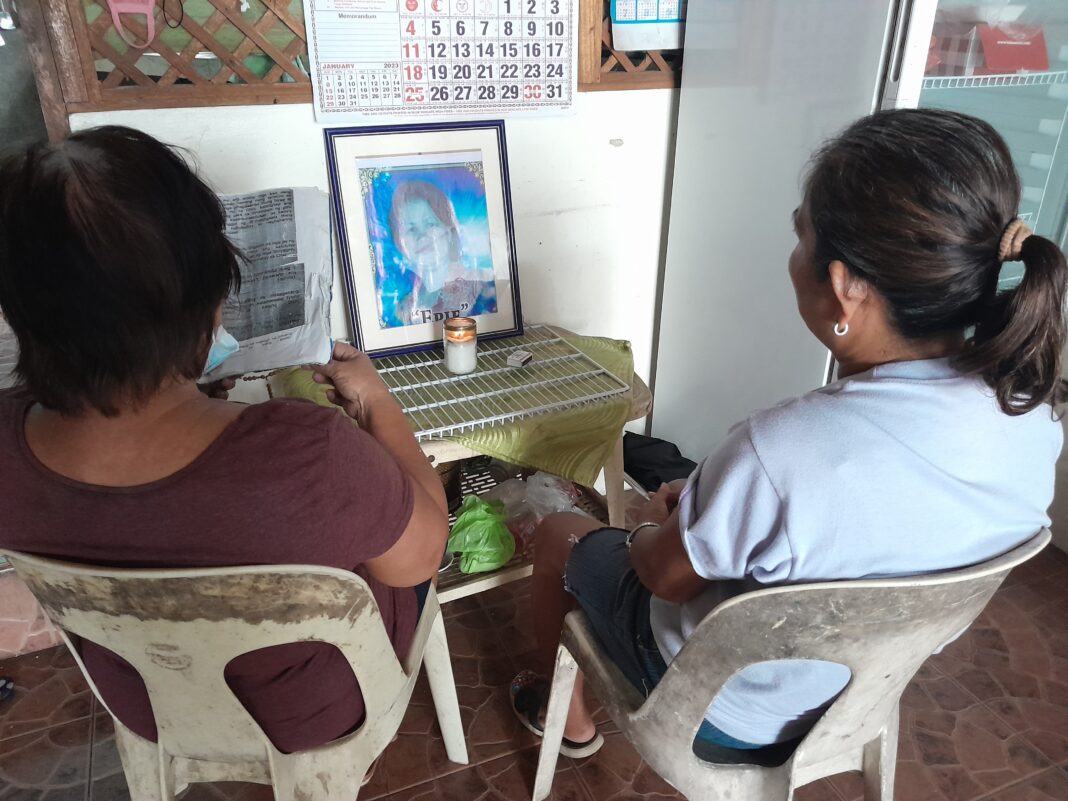
BULAKAN, Bulacan–The “pangangaluluwa,” the singing of songs for the dead in one’s house to another by a group of prayerful folks in the barrio during All Saints Day is now a dying tradition in this town as the singers and group leaders were already gone and there is hardly anyone to make it live on.
These years, only the prayers for the dead during the All Saints Day, all throughout the year and when someone dies remarkably continous.
Marilou Garciia, 58, from Barangay Tibig could no longer recall when she last sing for the dead together with her kin during All Saints Day.
Long before her aunts Nita and Yolanda Castro died in 2020 and early this year respecrively, the tradition of singing for the dead from one’s house to another during All Saints day has faded down, she told NEWS CORE on Monday.
When she was a teenager her aunts wlil bring her along with them during their pangangaluluwa in Tibig, adjacent Barangay of Maysantol and Balubad and even in Barangay Pitpitan and other places.
Nita who was last Interviewed by this reporter in 2016 said the tradition has bagan way back centuries ago during her mother “Nanay Dora’s” time, more than 70-80 years ago. Nita was then just about 7 years old when her mother tagged her along during pangangaluluwa.
The songs and prayers are meant for the souls of the departed to go to heaven and for the singers to be given dole outs or donations or even food.
On the nights of October to Nov. 1, a group of four-six people together with a guitarist will stop in front of the houses in the streets and villages they visited and just like Christmas song carollers, they will loudly sing songs. But, instead of Jingle Bells and Holy Night and Holiday Season classics and favorites, songs for the souls of the dead fill the air.
“Kaluluwa naming tambing, sa purgatoryo nanggaling, iyo nawang hanguin. Araw gabi’y manalangin. Kung kami’y lilimusan, dali-dalian baka kami’y saraduahan ng pintuan sa kalangitan. Jelos jelos, jelos jelos kanta nami’y natapos. Amen Jesus,” Garcia sang as she tried but failed to recall the full lyrics of the song.
After the singing, the house owners will give cash money and donations.
During the earlier times in the 1980’s, rich people gave P50-P100-P200, she recalled. In the recent times during the last years they staged it in early 2000, people gave as low as P100 to as high as P500 to P1,000, Garcia said.
The money were shared to group of church leaders in the barangay and the singers.
Conrado De Castro, 66, a former guitarist in Castro’s group said he could no longer remember the lyrics and the melody of the songs but, certainly, the old tradition is something he treasured.
He said it was already more than ten years ago when they last hit the streets with their songs for the All Saints Day.
Enrico San Pedro, 62, said what he remembered was they had a fun asking for the chickens and eggs of the house owner after singing songs for the dead.
“Hindi nawawala sa isip namin ang tradisyon pero hindi na magagawa ngayon. Trick or treat na ang uso ngayon, namimigay ng candy at nagsusuot ng nakakatakot kapag bisperas ng Undas,” he said.
Garcia said at one point, some groups of drunk men in their barrio had continued the pangangaluluwa, but this did not last long.
“Pag may lasing na lang, sila na lang nangaluluwa pero tumigil din ito agad at hindi nagtagal lalo na ng nag
-pandemic,” she said.
According to Felipe Gubatan, 67, he had seen a group of singers who went on pangangaluluwa while drunk as some kind of fun.
According to Mary Anne Guevarra, 64, now a leader of “mandarasal sa patay,” also in Tibig, prayers for the dead is different from pangangaluluwa. Today, she said, they continue with the prayers for the dead on and off All Saints Day while pangangaluluwa had stopped for years.
She said while pangangaluluwa is during night time of Nov. 24-Dec. 1, the prayers they do is during day time.
Guevarra used to be only just a “replyer” (sumasagot) during prayers by the leader (namumuno) in the group of now 84 year old Erlinda Bulaklak.
“Sumasagot lang po talaga ako noon, ang sagot po namin sa dasal ay “kaawaa’t patawarin ang kaluluwa ni……,” (iyong pangalan ng namatay). Sa ibang sagot naman, ang sinasabi ay “ipanalangan mo po siya”.
Prayers all throughout the year whether on a single day or 9-days novena is just a service to the village and no payment is asked except on All Saints Day.
She said barrio folks request them to pray for their dead relatives and they grant their request and held prayers. They do the prayers from one house to another from sun up to sun down. If nine days novena is asked during All Saints Day, they collect P300 as payment, but for only a day of prayer, they don’t demand any single penny. However, they do accept cash donations and foods given to them by the families who asked for prayers. “Wala pong bayad, kapag lang po nagdasal ng pasiyam pag Undas. Pero pag nagbigay po sila ng pera at meryenda, sopas po o tinapay o pansit, tinatanggap po namin,” he said.
Perfecto Martin, president of Kabesera, a historical and heritage group of Bulakan town said the youth today can revive the pangangaluluwa to keep the tradition alive.
“Peede naman ituloy ng ating mga kabataan kung mabibigyan nila ng pansin. Sana bigyan nila ng pansin,” he said.
San Pedro and the rest of them of Guevarra and De Castro agreed that the youth today should keep the legacy on All Saints Day except that the original form of songs should be maintained and not through rap, spoken poetry and other forms of modern literature.






